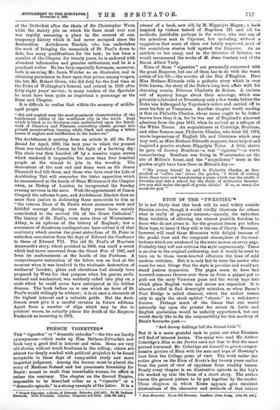FRENCH VIGNETTES.*
THE "vignettes" or "dramatic episodes "—the two are hardly synonymous—which make up Miss Betham-Edwards's new book vary a good deal in interest and value. Some are very old stories, without much freshness in the telling; others are almost too deeply marked with political prejudice to be found acceptable in these days of many-sided study and more impartial judgment. Among the former must be placed the story of Madame Roland and her passionate friendship for Buzot : meant to exalt that remarkable woman, its effect is rather the contrary. The chapter on the Second Empire, impossible to be described either as a "vignette" or a "dramatic episode," is a strong example of the latter. It is a • Emma Vignettes: a Series of Dramatic Episodes, 1787-1871. By N. Eetham- Edwards. With Portraits. London : Chapman and Hall. [10s. ed. net.]
resume of a book, now old, by M. Hippolyte Magen; a book
inspired by violent hatred of Napoleon III. and all his methods, justifiable perhaps in the writer, who was one of the prisoners sent to Cayenne, but including, without a suggestion that some of them are totally unproved, most of
the scandalous stories told against the Emperor. As an antidote to her essay, and in the interests of fairness, we would recommend the works of M. Jean Gnetary and of the Baron Albert Ferly.
None of these " vignettes " are personally concerned with the great Emperor, but one of them has to do with the worst action of his life,—the murder of the Duc d'Enghien. Here Miss Betham-Edwards tells a pathetic story which is very little known, the story of the Duke's long love affair with his charming cousin, Princess Charlotte de Rohan. A curious veil of mystery hangs about their marriage, which was privately celebrated at Strassburg only a few weeks before the Duke was kidnapped by Napoleon's orders and carried off to meet his fate at Vincennes. Another chapter worth reading is that on Philarete Chaska, whose name ought to be better known here than it is, for he was one of England's sincerest admirers from the year 1815, when he arrived as a refugee of the White Terror. An acquaintance of Coleridge, Bentham, and other famous men, Philarete Chasles, who lived till 1873, wrote impressions of English life and literature which may very well, as Miss Betham-Edwards suggests, have helped and inspired a greater student, Hippolyte Taine. A little sketch he gave of Jeremy Bentham—a real "vignette "—is worth remembering. Bentham was living in Westminster, on the site of Milton's house, and the " magnificent " trees in the garden might have been there in Milton's day
'"My young friend,' he said to Philarete Chasles, as they strolled or 'rather ran' about the garden, 'I think of cutting down them trees and transforming a place which was the cradle of Paradise Lost into a school for the study of utilitarian theories. Are you still under the spell of poetic ideals ? If so, so much the worse for you.'"






























































 Previous page
Previous page